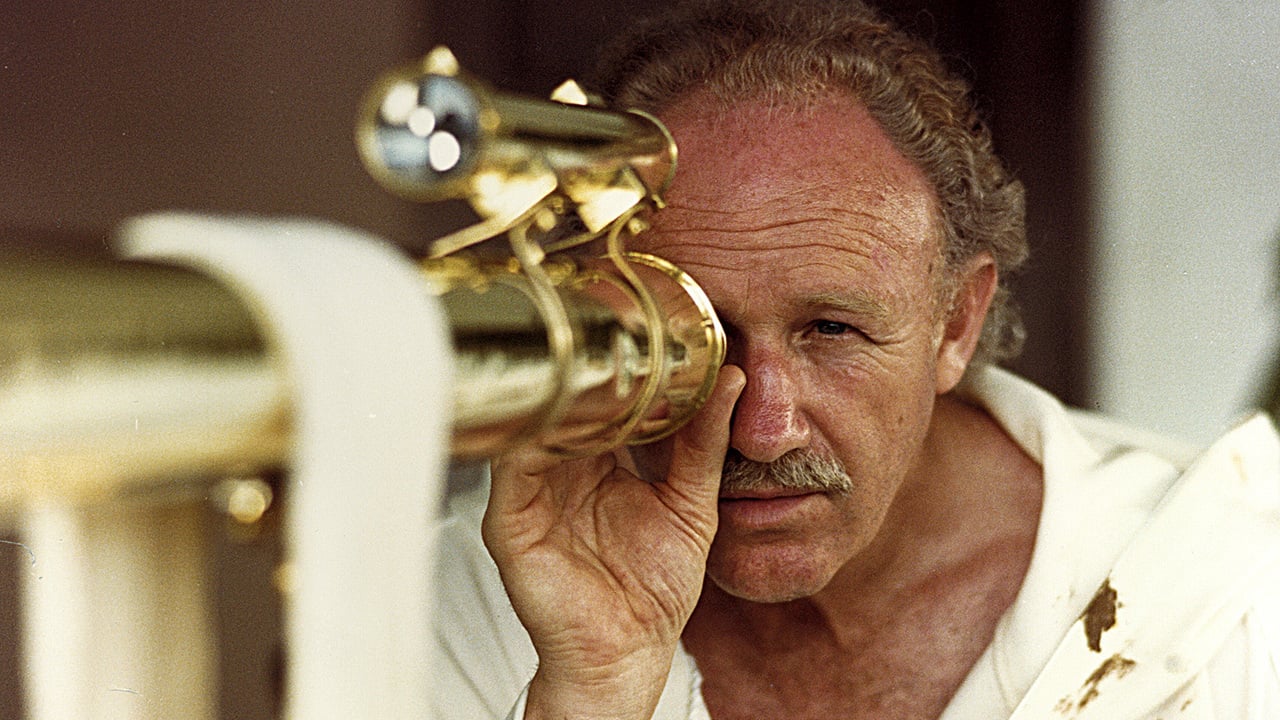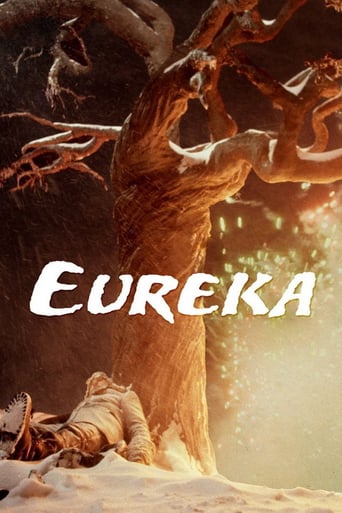

A Disappointing Continuation
... View MoreIt’s an especially fun movie from a director and cast who are clearly having a good time allowing themselves to let loose.
... View MoreThis is one of the few movies I've ever seen where the whole audience broke into spontaneous, loud applause a third of the way in.
... View MoreThis is a small, humorous movie in some ways, but it has a huge heart. What a nice experience.
... View MoreI had never heard of Ed Lauter until he died a few months ago, even though I had seen him in a number of movies; he simply hadn't registered in my mind. While watching Nicolas Roeg's "Eureka", I was surprised to see that Lauter co-starred. I had also never heard of Harry Oakes until I read about the movie. The movie had a good plot but seemed as though it could've been shorter. In the end, I think that the main point to derive from the movie is that prestige makes people go crazy. Gene Hackman's character struck gold and it made him rich, causing him to go nuts, and the insanity extends to his acquaintances. As shown in "It's a Mad, Mad, Mad, Mad World" and "The Wolf of Wall Street", people will do anything for money.Anyway, it's an OK not great movie.
... View MoreSomehow Roeg's themes tend to be better than the films themselves. He often picks original and unusual stories, but once again the result on the screen is disappointing. Not terribly interesting, even dull at certain parts in the first half, plus it's messy and not always convincing.It starts off with a reasonable twenty or so minutes in Alaska (or wherever), then goes nowhere for a while, with sometimes pointless and sometimes boring dialog. The second half gets confusing, with scenes just being piled up without any kind of sequence that would make sense. The courtroom scenes are tedious, throwing yet more confusion. Is Russell a part of Pesci's plan? Was she in on it? If not, why did she sleep with Rourke? If she wasn't in on it, then somehow her affair with Rourke doesn't make sense; she said something in her never-ending courtroom speech about having affairs herself, sleeping around with men. Was that supposed to clarify her sleeping with Rourke while her husband was on trial for murder? It doesn't quite wash. Her impassioned dialogue with her husband, acting as his own attorney, goes on forever but unfortunately also goes nowhere. After this speech, we understand both her and the plot even less. Then Hauer gets surprisingly acquitted, and he and Russell have a little talk in the last part, which doesn't really do much in the ways of shedding some light on anything.But easily the messiest part of the movie is the entire night of the murder; scenes of ritualistic natives' orgy mix with Hackman going around the island, first searching for Hauer and Russell and then bumping (literally, with his car) into his business partner. Hackman is lead to Pesci's men, but refuses to sign a contract, and this entire scene with him and the gang members is unconvincing and almost silly. Hauer JUST HAPPENS to be there and witnesses this meeting (I know it's an island, but surely it isn't only ten meters wide), and Hackman somehow sees him. Beforehand, Hauer had taken part in the afore-mentioned orgy, and escorts some women and a guy away from it, telling them not to talk about it.The whole thing appears disorganized, disconnected and lacks flow. The same goes for the scenes leading up to the ensuing murder of Hackman, which are just scenes piled one on top of another, as though put together by an editor drunk out of his mind. At the end of the film we hear Hackman's words again, something about gold or whatever. I have no idea what Roeg's point was; too many things here don't add up. The typically Roegian emphasis on the supernatural didn't help either. Hauer is very good. A film that strives for some "profound message", but fails to deliver it (if it even has one).
... View MoreBased loosely on an famous unsolved murder mystery (the multi-millionaire Sir Harry Oakes, who was brutally killed at his island retreat), Nicolas Roeg's "Eureka" takes this bare bones idea and transforms it into one of the most daring, ambitious and insightful films of all time. The film's screenwriter Paul Mayersberg packs each line of dialogue with thematic clues. The opening half hour is so stunning that it makes your head swim- the camera sweeps into the snowfields of British Colombia whilst Stanley Myers' hauntingly repetitive theme throbs on the soundtrack. Jack McCann (Gene Hackman) is prospecting for gold and ditches his partners. Surrounded by wolves, he gets a small talisman that he takes back to a brothel. The madam Frida fortells the future: "You'll find what you're looking for. But afterwards?" Jack sets off and discovers the gold (a genuinely amazing sequence). His ecstasy is short lived when he returns to his dying mistress. A burst of flame shoots forth and the film cuts to twenty years later when Jack is nostalgically telling the story to his daughter Tracy (Theresa Russell). Tracy is in love with an insubstantial dilettante Claude Mio Van Horne (Rutger Hauer), who Jack loathes. At that moment in time Tracy is looking forward, Jack is looking back. Jack is bored. He says "Once I had it all. Now I only have everything". He is aware that his daughter is his soul-clone. On the surface, they appear quite different- he's bitter, she's a hedonist. Yet small details (both admonish Jack's alcoholic wife Helen to "lay off the sauce" and they both have a stunning gift for mathematics) tell the truth. They understand each other perfectly. Jack is under siege from a pack of wolves who come in the shape of gangsters who want to develop Jack's island. Eventually the gangsters and Claude invade the house and Jack is brutally murdered. After this terrifying yet beautiful sequence, the film becomes more problematic. The courtroom scenes that follow contain dialogue that spells out the movie's themes and Russell's performance is hysterical. But the punchline as Tracy emasculates her husband is a doozy: "Claude...they despise you because you have me and I'm worth having. They despise me because I'm Jack's daughter and I have too much. And of course, they still despise Jack because he found what they're all still looking for". The movie atones for a lot with its gorgeous final moments as Claude paddles away. It's difficult to articulate the power this movie has. It has an extraordinary power to sweep you away- it's a crazy, violent, lovely, magical experience. It's about the human condition and it deals with issues that are almost never talked about- the price we pay for getting what we want, the moments in life where we find our purpose, the essence of people that is passed down through the generations, the difference between old and new souls. The film's main flaws (clumsy dialogue) are directly linked to the main virtue (the sheer overwhelming density of the material). Its a movie that will speak to you personally or leave you cold (there's no middle ground) and I find it almost an affront when somebody doesn't respond positively to it.
... View MoreI loved this movie. Often surrealist wackiness doesn't do it for me, especially if blended into more straightforward narrative, but this film did it, did it well, and made it work. The first act (the wackiest) is beautiful and no matter how strange totally fitting with the rest of the movie. A lot of the previous commentors or summarizers seem to have gotten the facts of the movie a bit skewed, the McCanns live in the Bahamas during World War II, the courtroom scene (which I think worked perfectly) switches the focus not to Claude Maillot van Horn but to Jack's daughter. The murder is truly nauseating and I have a pretty decent tolerance. The story is based on a true story, the odd life and unpleasant end of Sir Harry Oakes but Roeg goes with a more personal story than anything I've ever heard about Oakes. In real life he was the victim of a dispute between HRH the Duke of Windsor, governor of the Bahamas, and the Mafia..
... View More